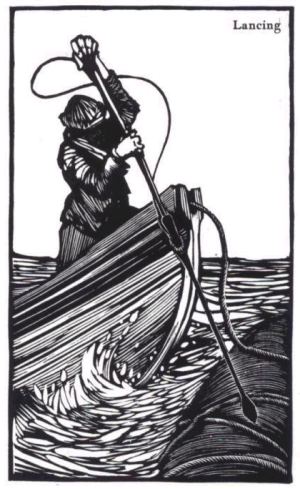“Self-Tracker” spied in Word Spy
Gary Wolf
February 20, 2009
 “Self-tracker” appeared yesterday on Word Spy, the wonderful word-tracking site by Paul McFedries. McFedries does not track word usage quantitatively; his approach is to keep an eye out for neologisms, capturing them as they appear. It is done out of fascination. We’ve had our eye on medical and psychological aspects of self-tracking recently at QS, so this seems like a good opportunity to give a nod to other motivations and other types of meaning. I will do a longer post next week about word tracking, but in the meantime here are two beautiful applications by Jonathan Harris: Wordcount and The Whale Hunt. Wordcount is a visualization of 86,800 English words, ordered by frequency of usage.* The Whale Hunt is a photographic log of nine days living with a family of Inupiat Eskimos in Barrow, Alaska. The photos are taken at a pace of at least one every five minutes, and put together in an intelligent interface that allows them to tick by at the pace of a heartbeat.
“Self-tracker” appeared yesterday on Word Spy, the wonderful word-tracking site by Paul McFedries. McFedries does not track word usage quantitatively; his approach is to keep an eye out for neologisms, capturing them as they appear. It is done out of fascination. We’ve had our eye on medical and psychological aspects of self-tracking recently at QS, so this seems like a good opportunity to give a nod to other motivations and other types of meaning. I will do a longer post next week about word tracking, but in the meantime here are two beautiful applications by Jonathan Harris: Wordcount and The Whale Hunt. Wordcount is a visualization of 86,800 English words, ordered by frequency of usage.* The Whale Hunt is a photographic log of nine days living with a family of Inupiat Eskimos in Barrow, Alaska. The photos are taken at a pace of at least one every five minutes, and put together in an intelligent interface that allows them to tick by at the pace of a heartbeat.
Harris’s work can be appreciated along several dimensions, but since on this site we like to think about self-tracking, maybe it is worth appreciating what lies beneath the surface of our hunt for meaningful data. Counting words, accumulating photos, piling up numbers about the self and scouring them using analytic techniques as sharp – sharper! – than the weapon of a harpooneer: we do this for utility, of course, and we do it to satisfy our curiosity, and we do it for the sake of exercising our intelligence, an excursion in problem for relaxation. (I once knew a brain surgeon, the father of a friend, who, during the short weeks of his vacation, traveled an island in the Puget Sound where he had a country home and drove around the pasture in a tractor, removing embedded rocks, his mouth slack with quiet joy at the extraction of each malignancy). But none of these reasons for self-tracking would count if we weren’t convinced of what you might call the depth of the material. An ocean of any kind presents itself a mystery – even an ocean of data.
*Frequency of usage, that is, in British English. The site is based on the British National Corpus, an amazing collection of samples of written and spoken English contained more than 100 million words. Wordcount contains every word in the BNC that occurs two times or more. But local influence is noticeable. For instance, “creepy” is the 33,349th most frequently used word, followed by “Cliftonville” and “Muggeridge.”


